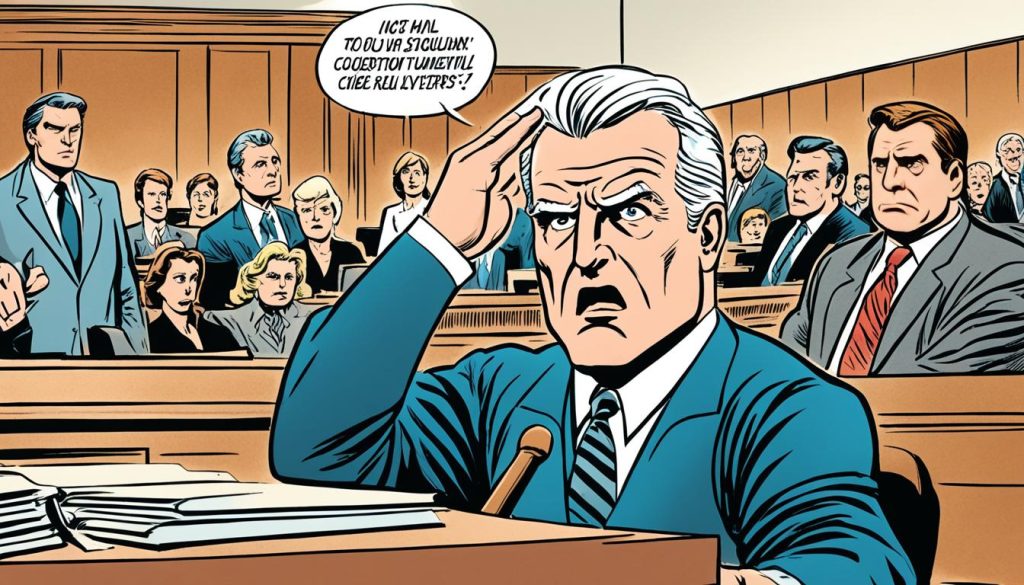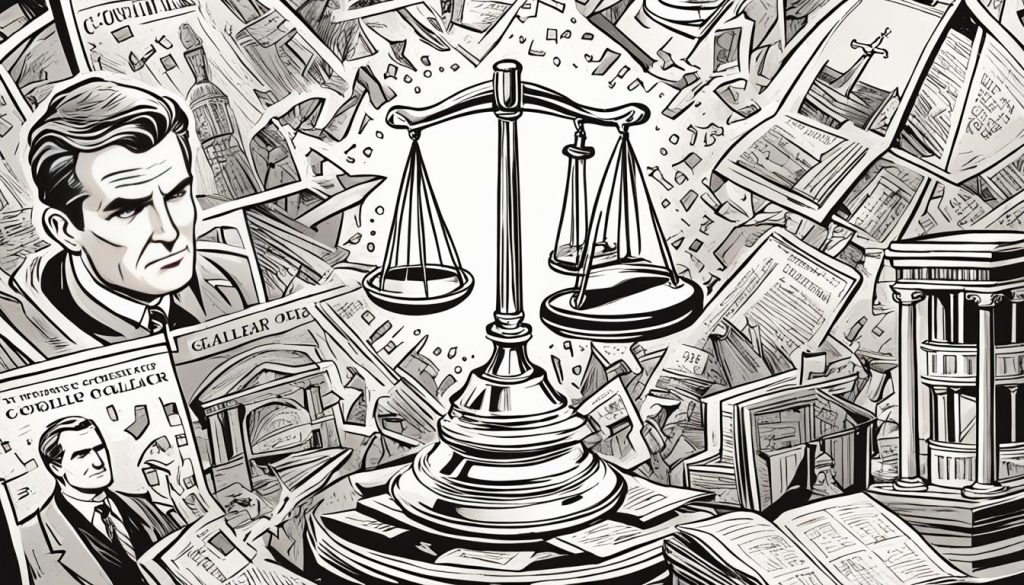White-collar crimes are non-violent offenses done for money. They can destroy businesses, take away family savings, and steal investors’ money1. The legal process for these crimes uses federal and state agencies, along with special legal plans to prove intent and blame1.
Prosecutors collect evidence like emails, meeting notes, and financial records to make strong cases1. They aim to show the defendant knew they were doing wrong2.
The legal process for white-collar crimes is complex, with prosecutors using special plans for each case1. In 2015, the Securities and Exchange Commission got 3,923 tips about corruption and other crimes3. The Federal Bureau of Investigation says white-collar crime costs the U.S. over $300 billion a year3.
Key Takeaways
- White-collar crimes can have big effects on businesses, people, and the economy.
- The legal process for these crimes uses federal and state agencies, along with special legal strategies.
- Prosecutors must gather evidence carefully to make strong cases and hold people accountable.
- The burden of proof in these cases is to prove guilt beyond doubt.
- The legal process for white-collar crimes is complex, with prosecutors using special plans for each case.
What are White Collar Crimes?
White-collar crimes are nonviolent offenses done for money. They happen in business or professional settings4. These crimes include things like antitrust violations and bribery54.
Other examples are computer fraud and embezzlement54. They also cover environmental law violations and government fraud54.
Overview of White Collar Offenses
Fraud is a big part of white-collar crime4. It includes insurance fraud and bank fraud4. Embezzlement happens in companies and government agencies4.
Money laundering hides illegal money through legal transactions4. Insider trading can lead to big fines4.
Common Examples
Cybercrime is a big threat to everyone4. Tax evasion is when people don’t pay their taxes4. The Anti-Money Laundering Act of 2020 fights against many illegal activities5.
Intellectual property theft steals ideas and inventions5.
Law agencies work together to fight white-collar crimes5. They look into big fraud cases like Enron and WorldCom5.
“The Madoff Victim Fund (MVF) gave over $3.7 billion to nearly 40,000 victims worldwide from the Bernard L. Madoff Investment Securities LLC (BLMIS) fraud.”5
| Offense | Penalty |
|---|---|
| Credit Suisse pleaded guilty to helping U.S. citizens avoid taxes by hiding income | Paid penalties of $2.6 billion |
| Bank of America agreed to pay $16.65 billion in damages for selling billions in mortgage-backed securities tied to properties with inflated values without proper collateral | $16.65 billion in damages |
Investigating White Collar Crimes
Looking into white-collar crimes is tough because the bad guys often hide their actions well6. It’s key to find solid evidence to make a strong case. Investigators work with agencies, experts, and those who speak out to find the truth6.
Gathering Evidence
Getting evidence for these crimes is hard because the crooks use tricks and new tech to hide their crimes6. Investigators have to carefully look at financial records, emails, and digital clues to figure out what happened6. Now, technology is a big help in fighting these crimes, helping to find and stop financial fraud6.
Structuring the Investigation
Setting up the investigation is key to dealing with white-collar crimes6. Investigators must carefully link together financial deals, company wrongdoings, and tricks used by the crooks6. They work closely with agencies like the SEC and the Mortgage Commission, and with financial experts and forensic accountants, to make a strong case67.
The London White Collar team at White & Case LLP is a top name in this area, winning the Legal500 2018 Firm of the Year award for “Risk Advisory: Regulatory Investigations and Corporate Crime.”7 The firm’s white-collar crime and investigations team is also praised by Chambers USA, known for their skill in complex cases7.
Legal Tools for White Collar Crime Cases
In the complex world of white-collar crimes, having the right legal tools is key. These tools help investigators and prosecutors tackle the complex issues of financial fraud and other serious crimes8.
Role of Regulatory Agencies
Groups like the Securities and Exchange Commission (SEC) keep the financial system safe8. They watch the market, look into suspicious activities, and work with law enforcement to catch criminals8.
Whistleblower Programs
Whistleblower programs are crucial for exposing financial crimes. They let people with inside info speak up safely8. This info is often key in building strong cases against those who misuse their power8.
Financial Analysis and Forensic Accounting
Experts in financial analysis and forensic accounting are vital in these cases8. They can deeply analyze financial data, find hidden patterns, and give prosecutors the evidence they need8.
With these tools, those fighting white-collar crimes can effectively tackle complex cases. They ensure justice is served and protect the financial health of people and businesses8.
“The tools available to combat white-collar crimes are as diverse as the crimes themselves, requiring a multifaceted approach to ensure justice is served.”
The National Association of Criminal Defense Lawyers (NACDL) fights for the rights of those accused of white-collar crimes9. They offer resources and advice to defense lawyers9. NACDL’s work includes9:
- Hosting CLE programs and discussions on white-collar crime trends
- Keeping a library of briefs and motions for defense lawyers
- Hosting webinars and publishing policy studies on white-collar crime issues
- Pushing for changes in laws on overcriminalization, federal discovery, conspiracy, and forfeiture
- Providing educational resources and tools for defense lawyers
Law firms like Latham & Watkins also have strong white-collar defense teams10. They have former government officials who know how to handle financial crimes10. These teams aim to solve cases quietly, protect clients’ reputations, and speak up for them10.
| Legal Tool | Key Attributes |
|---|---|
| Regulatory Agencies | Watch the financial markets, investigate suspicious activities, and work with law enforcement |
| Whistleblower Programs | Let people with inside info speak up safely |
| Financial Analysis and Forensic Accounting | Experts who deeply analyze financial transactions and provide key insights |
The legal tools against white-collar crimes are strong. They help investigators and prosecutors uncover financial wrongdoing and hold criminals accountable8. With these tools, justice in white-collar crime cases can be pursued more effectively8.
Prosecuting White Collar Crimes
Prosecuting prosecuting white-collar crimes is complex because of the detailed laws and cases. The type of court handling these crimes depends on where the crime happened. If it’s a state crime, a county district attorney will handle it11. But, if it crosses state lines or involves other countries, it’s a federal crime and goes to federal court12.
These crimes can have big effects and serious consequences. That’s why lawyers need to plan carefully to prove or disprove guilt11. Federal cases cover many crimes like fraud, embezzlement, and cybercrime12. These cases often take a lot of time and involve looking closely at financial records and emails12.
At the state level, state prosecution of these crimes is similar. District attorneys lead the case. The punishments can be severe, including fines, paying back money, losing assets, and going to jail111213.

Prosecuting prosecuting white-collar crimes needs a deep knowledge of the law and how to handle financial and tech evidence12. As these crimes change, lawyers must keep up and adjust their tactics to fight this challenge13.
Establishing Intent in White Collar Crime Cases
Prosecutors are key in proving intent in white-collar crime cases. They must show the defendant’s deliberate act14. To do this, they use evidence like emails, meeting notes, and financial records14. These items help show the defendant’s mindset and where fraud started14.
Finding digital clues is vital in catching the guilty and linking them to their actions14. Experts in digital forensics give crucial testimony in court14. They make complex financial evidence clear, which is important in white-collar cases15.
Proving intent is key in white-collar crime trials, and it varies by case15. Laws like the Patient Protection and Affordable Care Act of 2010 have changed what’s needed to prove intent16. This shows how intent rules in white-collar crime are changing.
To win white-collar crime cases, it’s crucial to carefully prove the defendant’s intent14. Prosecutors use digital evidence, financial records, and witness stories to build a strong case14. This approach helps show the defendant’s guilt and their intentional actions14.
white collar crimes, legal process, fraud defense
Being accused of a white-collar crime is a big deal, with serious outcomes possible. But, a good criminal defense lawyer can really help. They know how to guide you through the legal system and build a strong defense17.
A great defense lawyer looks closely at the case, checking out witnesses and evidence. They aim to question the prosecution’s claims and find the best defense17. They might look into things like lack of intent, entrapment, or work on plea deals to lessen the punishment.
White-collar crimes cover many things like embezzlement, money laundering, and fraud in real estate and banking17. These cases are complex, needing a deep legal knowledge and understanding of financial dealings.
In Florida, laws set out the charges and punishments for white-collar crimes17. For instance, stealing a trade secret is a third-degree felony17. Filing fake documents to harass or defraud is also a third-degree felony17.
Handling white-collar crimes means knowing about investigations, regulatory agencies, and financial analysis18. A skilled lawyer uses these tools to build a strong case and protect their client.
Getting help from a knowledgeable criminal defense lawyer is key when facing white-collar crime charges1718. They look at the facts, think of legal strategies, and use resources to help you through the legal process. This can lead to a better outcome.
Potential Penalties and Convictions
The penalties for white-collar crimes can be tough, from big fines to long prison stays. Federal judges often give sentences that match a guideline almost half the time for federal crimes19. For example, money laundering can lead to paying back double the laundered money, up to $500,000, and prison time19. Tax evasion might get you fined up to $100,000 or $500,000 for companies, and you could face five years in prison19.
Other white-collar crimes have big penalties too. Bank fraud could mean fines up to $1,000,000 and 30 years in prison19. Mail and wire fraud might get you 20 years in prison and a $100,000 fine if it involves a bank19. Securities fraud could lead to fines based on the fraud money and up to 25 years in prison19.
Prosecutors are very active in going after white-collar crime suspects. They know how serious these crimes are for people and the economy. So, the punishments can be harsh, including fines, home detention, community service, losing property, paying back money, and going to prison19.
In North Carolina, white-collar crime convictions mean you might have to pay back money to victims. This can be a lot of money, property, or assets20. You could also lose your professional licenses, making it hard to get a job again20.
Also, getting convicted of a white-collar crime in North Carolina can hurt your reputation. It can damage your relationships and your career, making you feel guilty and ashamed20. Victims might lose a lot of money, which can make them not trust others and struggle financially20.
Rehabilitation for white-collar crime convicts in North Carolina might include paying back money, showing you’re sorry, and doing community service20. You might also join programs to avoid a formal conviction20. The legal consequences include prison time, fines, and limits on your job options, showing the state’s strong stance on these crimes2021.
Defenses Against White Collar Crime Allegations
When facing white-collar crime charges, defendants have several legal defenses. One common defense is the lack of intent. This means the prosecution must prove the defendant acted with the intent to defraud or illegally gain money or benefits22. The defense aims to show flaws in the prosecution’s case and a lack of evidence of intent22.
Another defense is entrapment. This happens when law enforcement tricks or forces someone into committing a crime they wouldn’t have done otherwise22. Law enforcement might use undercover agents or other tactics to catch white-collar criminals. The defense can question the fairness and legality of these methods22.
Plea agreements can also be an option for a better outcome, especially if the evidence is strong against the defendant22. These agreements can lead to less severe charges or a shorter sentence. However, the defendant must admit to some guilt22.
The success of a white-collar crime defense often depends on proving a lack of intent, questioning evidence collection, and considering other legal points like involuntary intoxication or mental illness22. White-collar crimes come with serious consequences2322. It’s important for defendants to look at all legal options for the best outcome.

Conclusion
White-collar crimes can affect businesses, individuals, and the economy a lot24. They need a special way to be handled, needing deep knowledge, good detective work, and smart legal moves24. Prosecutors work hard to build strong cases against the accused. On the other side, defendants use legal tactics like questioning evidence, creating doubt, or making deals24.
Understanding white-collar crimes is key to protecting your rights and lessening the damage25. Having expert legal help is vital in the legal process. They look over the evidence and work for the best results25. If you’re facing charges or want to see justice done, knowing about white-collar crimes, the legal process, and fraud defense is crucial25.
When dealing with the justice system, remember, the goal is justice and protecting your rights. With the right legal advice and understanding the legal steps, you can get through this and do well26.
FAQ
What are white-collar crimes?
White-collar crimes are nonviolent crimes done for money. They affect businesses, people, and the economy a lot.
What are some common examples of white-collar offenses?
Common white-collar crimes include antitrust violations and bankruptcy fraud. Other examples are bribery, computer fraud, and credit card fraud. Also, economic espionage, embezzlement, and environmental law violations are common. Financial institution fraud, government fraud, and healthcare fraud are also on the list. Insider trading, insurance fraud, and intellectual property theft are part of it too. Kickbacks, mail fraud, money laundering, and securities fraud are included. Tax evasion, phone fraud, and public corruption round out the list.
How do investigators gather evidence for white-collar crime cases?
Investigators use legal tools to gather evidence for white-collar crimes. They work with agencies and experts to find hidden facts and link them to the crime.
What legal tools are used in white-collar crime investigations?
Legal tools are key in solving white-collar crimes. Working with agencies like the SEC is crucial. Whistleblower programs, financial analysis, and forensic accounting experts are also vital.
How are white-collar crimes prosecuted?
Where the crime happened decides where it’s prosecuted. If it’s a state crime, a county DA handles it. If it crosses state lines, it goes to federal court.
How do prosecutors establish intent in white-collar crime cases?
Prosecutors prove intent by showing the defendant meant to commit the crime. They use emails, meeting notes, and financial records to understand the defendant’s mind.
What options do defendants have in white-collar crime cases?
A good lawyer can help defendants in white-collar cases. They can argue the defendant didn’t mean to commit the crime or was tricked into it. They can also look into plea deals.
What are the potential penalties for white-collar crimes?
White-collar crimes can lead to big fines, detention, or even prison. The length of prison time depends on the crime. For example, health care fraud can get you up to 10 years in prison.

